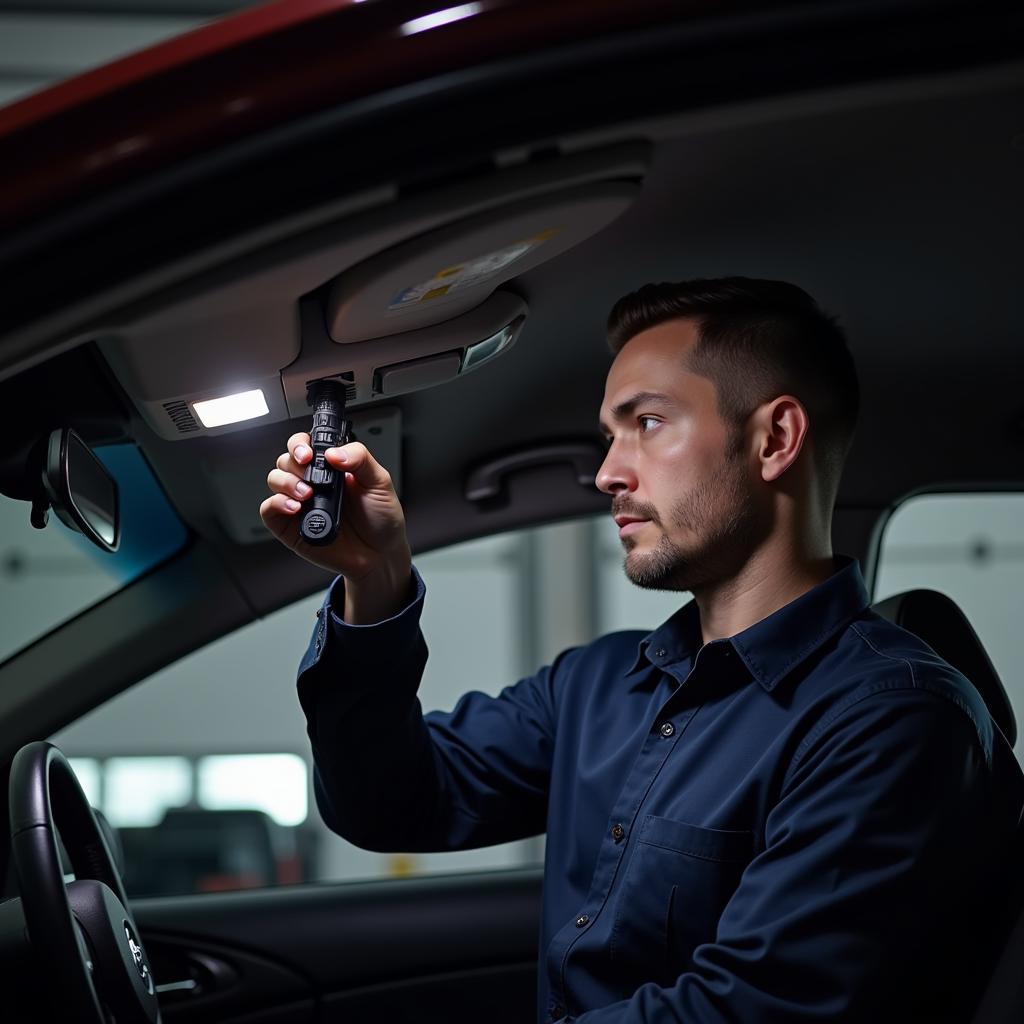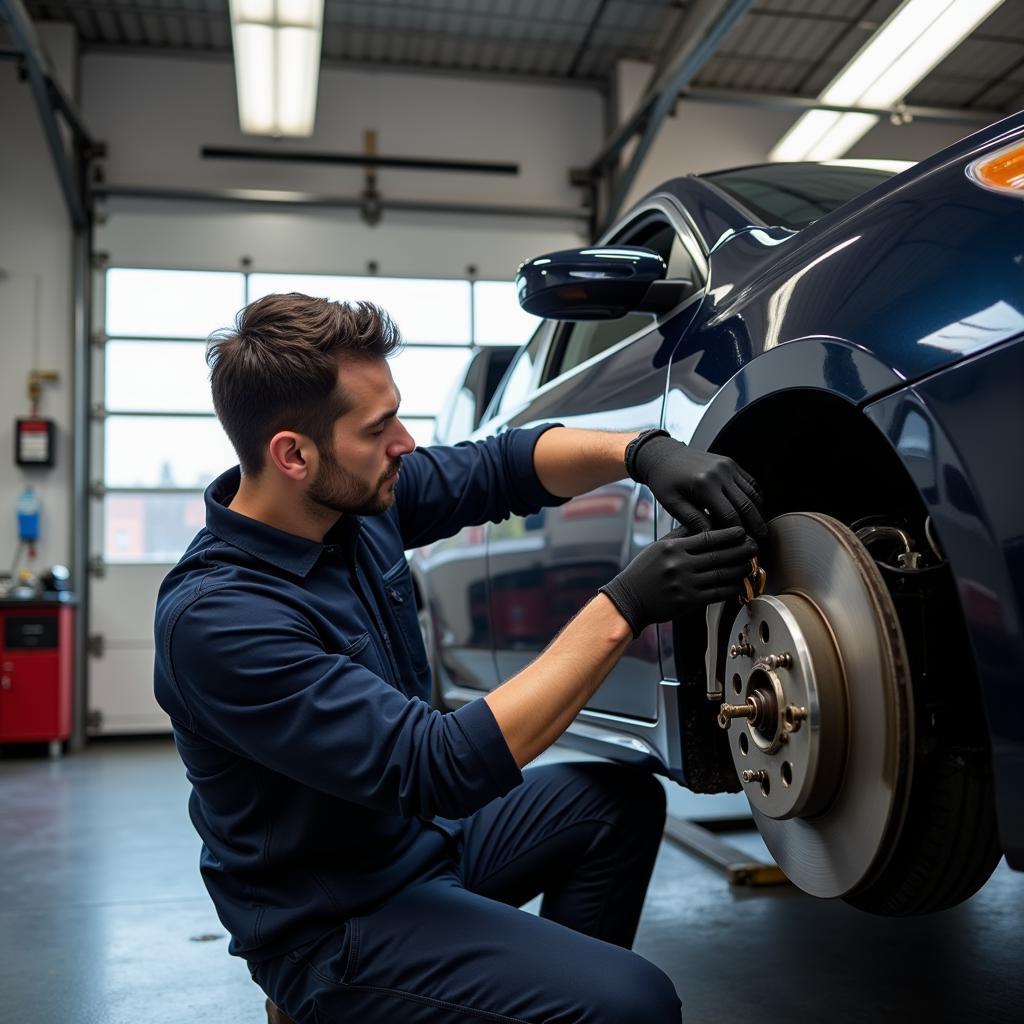The brake light warning on your Nissan Altima dashboard is a crucial safety feature, illuminating when the car’s computer detects an issue within the braking system. This warning light shouldn’t be ignored, as it could signify a problem that compromises your ability to brake safely. Several factors can trigger the Nissan Altima brake light warning, ranging from simple issues like a blown fuse or worn brake pads to more complex problems with the brake light switch or hydraulic system.
Common Causes of a Nissan Altima Brake Light Warning
Here are some of the most common reasons your Nissan Altima brake light warning may be on:
- Worn Brake Pads: One of the most frequent culprits is worn-out brake pads. Designed with a wear indicator that makes contact with the rotor and triggers the warning light as they thin, replacing your brake pads can often resolve the issue.
- Faulty Brake Light Switch: The brake light switch, positioned beneath the brake pedal, plays a vital role in activating your brake lights when you apply the brakes. A malfunctioning switch might prevent the lights from illuminating or cause them to stay on constantly, triggering the warning light.
- Blown Fuse: Your Nissan Altima’s brake lights operate on a fuse. If this fuse blows, the brake lights won’t function correctly, prompting the warning light on your dashboard. Replacing a blown fuse is a simple fix, but it’s crucial to determine the underlying cause of the blown fuse to prevent recurrence.
- Hydraulic System Problems: Your car’s braking system relies on hydraulic pressure to function correctly. Low brake fluid, a leak in the hydraulic lines, or a failing master cylinder can disrupt this pressure, leading to the brake light warning and potentially compromising braking performance.
- Faulty ABS System: While less common, issues within the Anti-lock Braking System (ABS) can also trigger the brake light warning. This usually indicates a problem with the ABS module, wheel speed sensors, or the wiring within the system.
Diagnosing the Problem
Identifying the root cause of the brake light warning often involves a multi-step process:
- Check Brake Fluid: Begin by inspecting the brake fluid level in the reservoir under the hood. If the fluid level is low, there might be a leak or your brake pads might be excessively worn.
- Inspect Brake Lights: Have a friend or family member press the brake pedal while you check if all brake lights (left, right, and high mount) are functioning correctly.
- Check the Fuse: Refer to your owner’s manual to locate the fuse box and identify the correct fuse for your brake lights. Visually inspect the fuse for any signs of damage or use a multimeter to test it.
- Inspect the Brake Light Switch: Located above the brake pedal, the switch can be tested for continuity with a multimeter. A lack of continuity indicates a faulty switch.
 A mechanic inspecting the brake light switch on a Nissan Altima
A mechanic inspecting the brake light switch on a Nissan Altima
When to Seek Professional Help
While some causes of the brake light warning can be diagnosed and resolved with basic mechanical knowledge, it’s recommended to seek professional help if:
- You’ve checked the common causes and the warning light persists.
- You’re uncomfortable working on your car’s braking system.
- You suspect the issue stems from the ABS system or other complex components.
Attempting to diagnose or repair complex braking system issues without proper knowledge and equipment can be dangerous.
Preventing Future Issues
Regular maintenance is key to preventing brake light warnings and ensuring optimal braking performance:
- Regular Brake Inspections: Adhere to your Nissan Altima’s recommended maintenance schedule for brake inspections.
- Timely Brake Pad Replacement: Replace your brake pads before they wear down completely to avoid damage to the rotors and other brake components.
- Address Brake Fluid Leaks Promptly: If you notice a drop in brake fluid level or suspect a leak, address it immediately to prevent further damage and ensure safe braking.
“The braking system is critical to your safety,” says master mechanic John Davis. “Never ignore the brake light warning. Early diagnosis and repair can save you time, money, and most importantly, keep you safe on the road.”
 Mechanic repairing the brake system on a Nissan Altima in a professional garage
Mechanic repairing the brake system on a Nissan Altima in a professional garage
Conclusion
The brake light warning on your Nissan Altima signals a potential issue with your braking system that requires immediate attention. While simple fixes like replacing a blown fuse or worn brake pads can often resolve the issue, more complex problems might necessitate professional diagnosis and repair.
Remember, a properly functioning brake system is crucial for your safety and the safety of others on the road. Don’t hesitate to seek professional help from a trusted mechanic or your local Nissan dealership if you’re unsure about diagnosing or repairing the issue yourself.
FAQs about Nissan Altima Brake Light Warnings:
Q: Can I still drive my Nissan Altima with the brake light warning on?
A: While it might be possible to drive for a short distance, it’s strongly advised against it. The warning light indicates a potential problem with your braking system, compromising your safety.
Q: How much does it cost to fix a brake light warning on a Nissan Altima?
A: The repair cost depends on the underlying cause. A simple fix like replacing a blown fuse might cost a few dollars, while more complex repairs involving the ABS system or hydraulic components can range from hundreds to thousands of dollars.
Q: How often should I check my Nissan Altima’s brake fluid?
A: It’s recommended to check your brake fluid level at least once a month and top it off if necessary.
Q: Can I use any brake fluid for my Nissan Altima?
A: Always use the brake fluid type specified in your owner’s manual. Using the incorrect fluid can damage your braking system.

